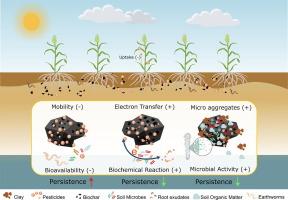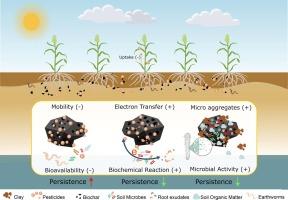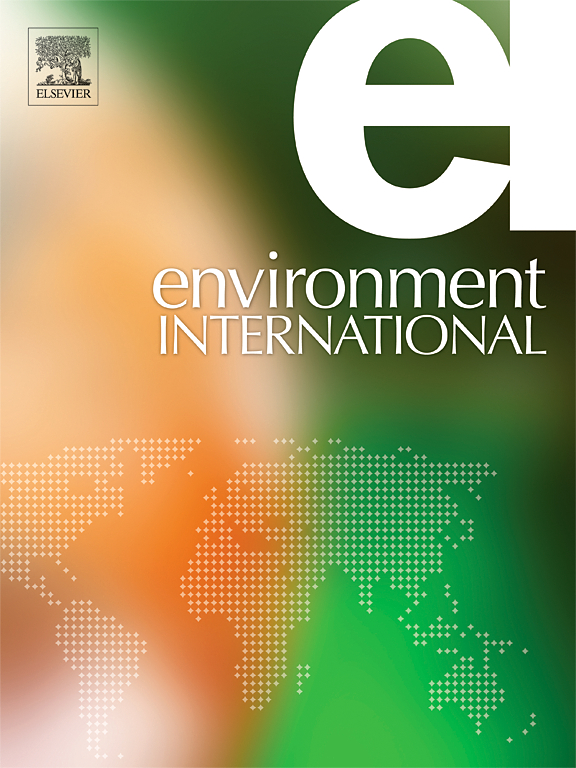Global meta-analysis and machine learning reveal the critical role of soil properties in influencing biochar-pesticide interactions
IF 10.3
1区 环境科学与生态学
Q1 ENVIRONMENTAL SCIENCES
引用次数: 0
Abstract
Biochar application in soils is increasingly advocated globally for its dual benefits in enhancing agricultural productivity and sequestering carbon. However, lingering concerns persist regarding its environmental impact, particularly concerning its interactions with pesticide residues in soil. Previous research has fragmentarily indicated elevated pesticide residues and prolonged persistence in biochar-amended soil, suggesting a potential adverse consequence of biochar application on pesticide degradation. Yet, conclusive evidence and conditions for this phenomenon remain elusive. To address this gap, we conducted a comprehensive assessment using meta-analysis and machine learning techniques, synthesizing data from 58 studies comprising 386 observations worldwide. Contrary to initial concerns, our findings revealed no definitive increase in pesticide concentrations in soil following biochar application. Moreover, a significant reduction of 66 % in pesticide concentrations within soil organisms, such as plants and earthworms, was observed. The quantitative analysis identified soil organic matter content as a key factor influencing biochar-pesticide interactions, suggesting that applying biochar to soils rich in organic matter is less likely to increase pesticide persistence. This study provides a critical assessment of the environmental fate of pesticides under biochar application, offering valuable guidance for the optimal utilization of both pesticides and biochar in sustainable agricultural practices.


全球荟萃分析和机器学习揭示了土壤特性在影响生物炭与农药相互作用中的关键作用
在土壤中施用生物炭具有提高农业生产力和固碳的双重好处,因此在全球范围内得到越来越多的提倡。然而,人们对生物炭的环境影响,尤其是生物炭与土壤中残留农药的相互作用仍有顾虑。以往的研究零星地表明,经生物炭改良过的土壤中农药残留量升高且持续时间延长,这表明生物炭的应用可能会对农药降解产生不利影响。然而,这种现象的确凿证据和条件仍然难以捉摸。为了填补这一空白,我们利用荟萃分析和机器学习技术进行了一次全面评估,综合了来自全球 58 项研究、386 个观测点的数据。与最初的担忧相反,我们的研究结果表明,施用生物炭后,土壤中的农药浓度并没有明显增加。此外,我们还观察到植物和蚯蚓等土壤生物体内的农药浓度大幅降低了 66%。定量分析发现,土壤有机质含量是影响生物炭与农药之间相互作用的关键因素,这表明在富含有机质的土壤中施用生物炭不易增加农药的持久性。这项研究对施用生物炭情况下农药的环境归宿进行了重要评估,为在可持续农业实践中优化利用农药和生物炭提供了宝贵的指导。
本文章由计算机程序翻译,如有差异,请以英文原文为准。
求助全文
约1分钟内获得全文
求助全文
来源期刊

Environment International
环境科学-环境科学
CiteScore
21.90
自引率
3.40%
发文量
734
审稿时长
2.8 months
期刊介绍:
Environmental Health publishes manuscripts focusing on critical aspects of environmental and occupational medicine, including studies in toxicology and epidemiology, to illuminate the human health implications of exposure to environmental hazards. The journal adopts an open-access model and practices open peer review.
It caters to scientists and practitioners across all environmental science domains, directly or indirectly impacting human health and well-being. With a commitment to enhancing the prevention of environmentally-related health risks, Environmental Health serves as a public health journal for the community and scientists engaged in matters of public health significance concerning the environment.
 求助内容:
求助内容: 应助结果提醒方式:
应助结果提醒方式:


